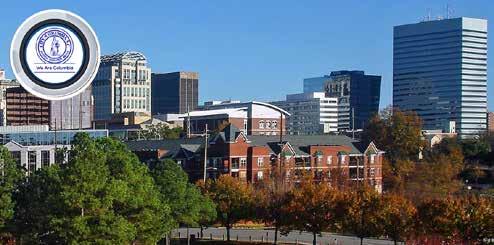
3 minute read
COLUMBIA WATER
Local Sustainability in Action!
by Mimi Draft
Advertisement
Season’s Greetings from Columbia Water
Columbia Water is the drinking water, wastewater and stormwater utility owned and operated by the City of Columbia, South Carolina. Columbia Water operates 24 hours a day and seven days a week to maintain the city’s drinking water supply, collect and treat the city’s wastewater, design and oversee construction of many capital improvement projects, and monitor stormwater drainage and water quality throughout the City of Columbia.
Trash the Poop
Pet waste is one of the most common contaminants in municipal water supplies. When dog excrement is left on the ground, it washes away to water sources, like rivers or lakes, during storms. While some may believe that pet waste will decompose like fertilizer in a grassy area or sidewalk, dog waste can contain up to three times more pathogens than waste from other animals.
In the City of Columbia, storm drains are not connected to the sewer system, and anything washed away from the ground in stormwater runoff has the potential to end up in drinking water sources, like the Broad River or Lake Murray. With the Trash the Poop campaign, residents of the Midlands are encouraged to pick up pet waste and put it in the trash.
Learn more about the Trash the Poop campaign at TrashThePoop.com.
Trash the Wipes and Trash the Grease
One of the biggest issues in municipal wastewater treatment systems are fatbergs. A fatberg is a mass of waste materials that have hardened due to not breaking down in sewer lines. These obstructions typically contain “flushable” wipes that are sold in retail stores and residue from fats, oils and grease (FOG) poured into kitchen sinks and garbage disposals.
In the winter, FOG may congeal and has the potential to burst pipes, amounting to costly damage in residential and commercial water systems. These breaks can also be an environmental nuisance and cause unnecessary contamination in municipal water systems. The City of Columbia spends an average of $1.5 million annually and 4,500 man hours toward unclogging and vacuuming the wastewater collection system lines each year. With the Trash
the Grease/ Trash the Wipes
campaign, Columbia Water works to educate the public about the proper disposal of items in sewer lines. Here are tips to prevent sewer line clogs and breaks: • Pour unused cooking oils in a mason jar or can. Let the liquid cool, and throw the can or jar in the garbage. **Please note that cans or jars filled with food waste should not be sorted in the recycling container. • Scrape plates and dishes into the trash can instead of the garbage disposal. • Consider recycling large quantities of unused oil. Contact local solid waste departments for more information. • Put flushable wipes, baby wipes, makeup wipes, disinfectant wipes, feminine hygiene products, cotton balls, and other personal care items in the trash. • Report sanitary sewer overflows to local wastewater facilities.
Learn more about cooking oil disposal at ColumbiaSCWater.net/fog.
My Columbia SC App
City of Columbia customers are encouraged to download the My Columbia SC app on any Android or Apple device. This free and easy app is a one-stop shop that allows customers to request work orders, report concerns, view City of Columbia maps, search City of Columbia job vacancies, and get answers to frequently asked questions from the City of Columbia Customer Care Team. Please note, the app is not to be used in the case of an emergency.
Learn more about Columbia Water and its community programming at ColumbiaSCWater.net. Be sure to follow @
ColumbiaSCWater on Facebook, Twitter
and Instagram for information about events and the latest water news. See ads, pages 5 and 7.







